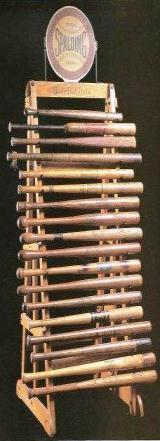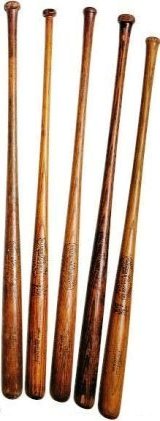Runners Passing Runners
by M Struck
(Springfield, VA)

M Struck asked: Runner on first, no out, ball hit to center.
The CF makes a long, but relatively easy run to the LF alley, to the ball, so the runner, having gone half-way, turns away from the ball/play.
As he heads back to 1st, the CF has it glance off his glove and hit the ground but stay right in front of him. Bad baserunning, but lets move on.
The batter/runner now passes the retreating base runner as this happens and the umps look at each other. This is not useful.
The CF picks up the ball and throws it to 2nd, securing what perhaps would be a force.
But someone is out for passing each other. Who?
If the batter is out, is it no longer a force at second, at that instant, so the CF to SS throw is meaningless as a force?
If the batter is out for passing the "live" baserunner, then the original baserunner could - as he did - retreat to 1b.
As manager of the Babe Ruth team, my view was the BATTER was out under base ball rule 7.08 for passing the other runner, never mind what direction that person was going.
The problem was the sequence of the play. The runners passed each other before the ball got to 2b and the so - called force play was made.
So at that instant, it would seem the BATTER/RUNNER was out, and the other dude was free to return to 1b, which he did not. The Ump called him out at 2b, and as he realized what happened, he headed for the dugout while the batter/runner retreated to 1b and was allowed to remain, safely.
Bad call? I saw it as a double play; batter out for passing the other guy; and the second guy out for leaving the field of play forever while our fielder was standing on 1b wondering which of the two guys he got out.
I guess the answer was not that the 1b had to chase the guy into the dug out and tag him.
Rick answered: M Struck, thank you for your question.
I have to say, that was quite the play and must have generated some serious discussion in real time.
This past spring was my 40th high school coaching season, never have seen this situation come up.
I have been unable to determine if the batter/runner passing the runner from first base is a dead ball situation or a delayed dead ball situation. My belief is it would be a delayed dead ball call, so that the rest of the play could finish out.
When the umpires saw the base runner had been passed, at that point one of them should have made a dead ball signal and nonverbally motioned the batter/runner out.
You are right, at that point in time, the base runner is no longer in a force situation, and could have gone either to second, or back to first.
Had he selected to head for second, and the infielder tagged the bag and not the runner, he would be safe.
If he had selected to return to first, he would be safe at first.
For the double play to occur, the tag situation would have needed to happen.
This is where it becomes complicated. Since the umpires didn't make a call on the runners passing, then called the runner from first out on a force, thus leaving him in limbo so he heads to the dugout, a logical thing to do the way they called it.
You didn't say whether there was any discussion on this decision or not; but at the point where the umpire's finalized their decision, the offensive teams' manager had the right to appeal that decision to the umpire who actually made the decision.
Rule 8.02 Appeal of umpire's decisions:(b) If there is reasonable doubt that any umpire's decision may be in conflict with the rules, the manager may appeal the decision and ask that a correct ruling be made. Such appeal shall be made only to the umpire who made the protested decision.
(c) If a decision is appealed, the umpire making the decision may ask another umpire for information before making a final decision. No umpire shall criticize, seek to reverse or interfere with another umpire's decision unless asked to do so by the umpire making it. If the umpires consult after a play and change a call that had been made, then they have the authority to take all steps that they may deem necessary, in their discretion, to eliminate the results and consequences of the earlier call that they are reversing, including placing runners where they think those runners would have been after the play, had the ultimate call been made as the initial call, disregarding interference or obstruction that may have occurred on the play; failures of runners to tag up based on the initial call on the field; runners passing other runners or missing bases; etc., all in the discretion of the umpires. No player, manager or coach shall be permitted to argue the exercise of the umpire's discretion in resolving the play and any person so arguing shall be subject to ejection.
Rule 8.02(c)Comment (Rule 9.02 (c) Comment);...A manager is permitted to ask the umpires for an explanation of the play and how the umpires have exercised their discretion to eliminate the results and consequences of the earlier call that the umpires are reversing. Once the umpires explain the result of the play, however, no one is permitted to argue that the umpires should have exercised their discretion in a different manner.
All the above has to happen as soon as the play ends. Based on your description of the play, the batter surely was out and the base runner safe or out at 2B by a tag play, or safe back at 1B.
It truly must have been an exciting evening. Those types of things certainly do happen in baseball; but the process is there to work through it and get it right. Once the umpires determine that they have it wrong, they have full power to make it all right, and then move forward.
Yours in baseball,
Rick





